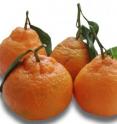Organic plant waste proves effective weed control for citrus trees
Interest in organic crop production is increasing around the world. Organics are healthy for consumers while adding environmental benefits and decreasing the amount of synthetic herbicides in foods, soil, and water. While organics gain popularity with consumers, organic farmers are faced with new production challenges, especially managing and reducing invasive weeds. Synthetic mulches, manufactured from petroleum-based materials, have been used extensively for weed control. The downside: synthetic mulches cause increased runoff compared with "natural" mulches, disposal and landfill concerns, and are highly restricted in "certified organic" production. Interest in non-chemical weed control methods has increased in recent years with the spread of organic farming and environmental concerns over the adverse effects of herbicides. Economically and environmentally sustainable weed control alternatives, such as non-synthetic or natural mulch, can provide many benefits for growers. Natural mulches have been proven effective in weed suppression, moisture conservation, and improved water infiltration.
Egyptian citrus fruits, especially those grown organically, are exported to many countries. "Mandarins" include a diverse group of citrus fruits that are characterized by bright peel and pulp color, excellent flavor, easy-to-peel rind, and segments that separate easily. Mandarins are grown in sandy soil, presenting special challenges to growers. Weeds compete with citrus for nutrients and water, harbor pests and host pathogens, and impact the efficiency of orchard operations. Not surprisingly, use of chemicals for controlling weeds in citrus crops can affect physical and chemical properties and quality of fruits.
Researchers from the Botany Department at the National Research Center in Giza, Egypt recently published the results of a two-year study of 15-year-old mandarin trees. The study compared the effects of rice straw mulch, cattail mulch, black plastic mulch, hand-hoeing, cultivation, glyphosate, and unweeded control treatments on weed control, fruit yield, and fruit quality.
"The objective of this study was to investigate the effect of plant mulches with different depths compared with synthetic mulch, hand-hoeing, cultivation, and glyphosate on weed control efficacy and quantity and quality of mandarin fruits", remarked Dr. H.F. Abouziena, the project's lead researcher. Abouziena added, "In Egypt, rice straw is considered one of the most important plant waste problems, and cattail weed is a problem in all water canals. Waste materials such as rice straw, weeds, aquatic weeds, bark, and composted municipal green waste can provide effective weed control."
The research team also found that the greatest control (94% to 100%) of weeds occurred with the plastic mulch and three mulch layers of rice straw or cattail. Covering soil with two layers of cattail or rice straw mulch resulted in an 85% to 98% control of weeds. Plastic mulches, cattail mulch in two or three layers, and rice straw in two-layer treatments significantly increased the fruit yield without significant differences among these superior treatments. Soil mulching with three layers of rice straw, cultivation, glyphosate, and plastic mulch treatments caused a significant reduction in weed density and weed biomass, but gave lower yield than superior treatments. Total acidity and vitamin C were significantly lower in the unweeded control than most weeded treatments.
"These results demonstrate that two layers of cattail or rice straw mulch could be used effectively for controlling weeds in citrus groves. Their effectiveness in controlling weeds may increase their use in agriculture systems with a concomitant decrease in the need for synthetic herbicides. Further studies are needed to evaluate their side effects on beneficial organisms, diseases, and insects", observed Abouziena. The report included an important caveat for producers; because of a higher depth of natural mulches required to suppress weeds, transport costs can be high and prohibit their use, unless the material is produced on the farm.
Source: American Society for Horticultural Science
Other sources
- Weeds used for weed controlfrom UPIMon, 29 Dec 2008, 22:42:28 UTC
